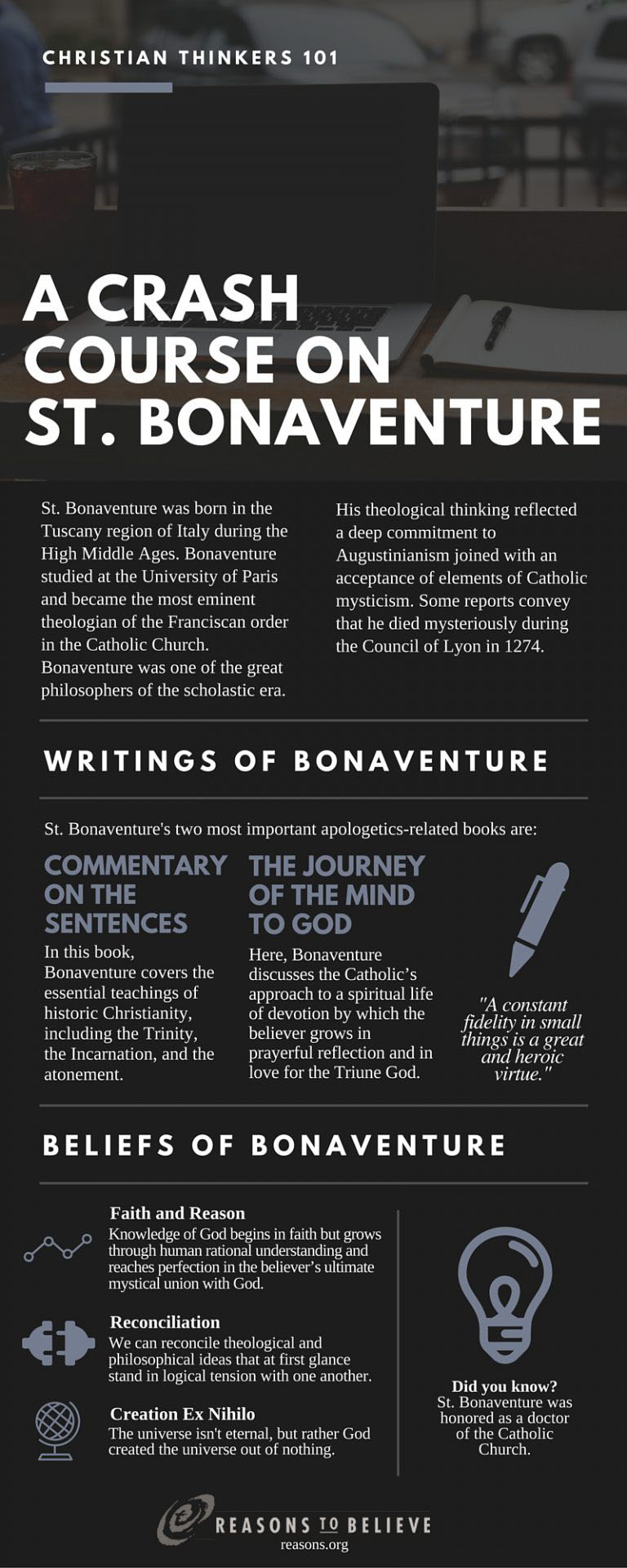Christian Thinkers 101: A Crash Course on St. Bonaventure
St. Bonaventure was one of the great thinkers of the Middle Ages, but what exactly did he believe, and what else did he contribute to Christendom? Here’s your crash course on the life and accomplishments of St. Bonaventure—and why he still matters today.
Who Was St. Bonaventure?
St. Bonaventure (c. 1221–1274) was born in the Tuscany region of Italy during the High Middle Ages. Bonaventure studied at the University of Paris and became the most eminent theologian of the Franciscan order (named after St. Francis of Assisi) in the Catholic Church. Like his theological colleague, Thomas Aquinas, Bonaventure was also one of the great philosophers of the scholastic era, serving as both a scholar and a church official (minister general of the Franciscans). His theological thinking reflected a deep commitment to Augustinianism joined with an acceptance of elements of Catholic mysticism. Some reports convey that he died mysteriously during the Council of Lyon in 1274.
What Did St. Bonaventure Write?
Among several works, Bonaventure’s two most important philosophical and theological books are Commentary on the Sentences and The Journey of the Mind to God. The first is considered St. Bonaventure’s theological masterpiece in which he covers virtually all the essential teachings of historic Christianity, including the Trinity, the Incarnation, and the atonement. The second book discusses the Catholic’s approach to a spiritual life of devotion by which the believer grows in prayerful reflection and in love for the Triune God.
What Did St. Bonaventure Believe?
Christians of various traditions continue to defend several of Bonaventure’s beliefs. The following are perhaps St. Bonaventure’s three most important ideas or arguments for the God of Christian theism:
- For St. Bonaventure, knowledge of God begins in faith but grows through human rational understanding and reaches perfection in the believer’s ultimate mystical union with God.
- St. Bonaventure is credited with an insightful ability to reconcile theological and philosophical ideas that at first glance stood in logical tension with one another. For example, as noted above, faith and reason at first seem in conflict, but trust (the root of faith) can be placed in a reasonable source (God).
- While accepting certain Aristotelian principles within his overall philosophical theology, St. Bonaventure rejected outright Aristotle’s idea of an eternal universe and instead accepted the Christian teaching in which God created the universe out of nothing.
Why Does St. Bonaventure Matter Today?
St. Bonaventure is criticized for synthesizing Greek (pagan, nonbiblical) philosophical ideas (mostly Platonic but some Aristotelian) with the Christian theological worldview. Nevertheless, Bonaventure viewed Greek wisdom as a natural revelation from God. But St. Bonaventure, standing close to Augustine and Anselm, is one of the great philosophical theologians of the Catholic Church. Honored as a doctor of the church, he is also one of the truly great thinkers of the Middle Ages. Evangelicals can appreciate Bonaventure’s idea that while faith does not originate in reason (argument), the faith which begins in divine grace is nonetheless supported by reason.
Other articles in the Christian Thinkers 101 series: St. Augustine; C. S. Lewis; Blaise Pascal; St. Anselm; St. Athanasius; St. Thomas Aquinas; Jonathan Edwards; Søren Kierkegaard; Martin Luther; John Calvin; Irenaeus; Tertullian; St. Basil; St. Jerome; Justin Martyr; Walter Martin; Ronald Nash; Mortimer Adler
Reflections: Your Turn
Bonaventure affirmed that Christians encounter God with both mind and heart. What faculties do you use in loving the Lord?
Resources
- To read his work, see Bonaventure: The Soul’s Journey into God, the Tree of Life, the Life of St. Francis translated by Ewert Cousins.
- For the life and thoughts of St. Bonaventure, see The Philosophy of St. Bonaventure by Etienne Gilson.







